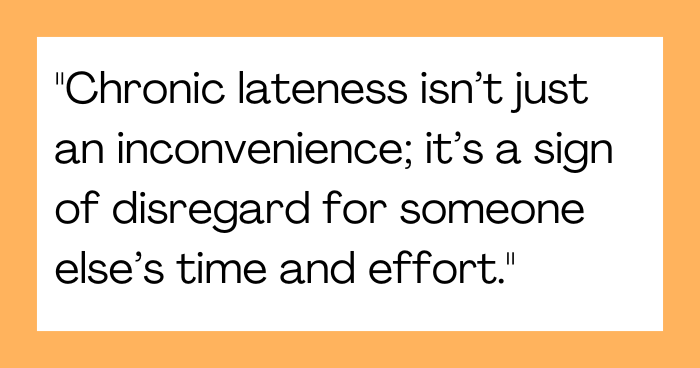Fed Up with Chronic Lateness: Friend Walks Out on Lunch Date Without Warning
A 32-year-old woman has vented about how her friend ruining their lunch date by being notoriously late again. She put up with it for years but saw him when they last met this year and said, no more. The lunch was at 12pm, and by 12:30pm, her friend still hadn’t arrived or given any news. She left without him, frustrated and long past the point of wanting to wait for an explanation.
About 40 minutes past when they had agreed to meet, her friend texted: “Here, where are you? Her honest response was that she had thought he had left and had gone home. The woman felt this was not her problem to chase someone who couldn’t be bothered to respect her time, despite her husband saying that it would have been nice to call or text to check on them. Now, this isolated incident, as national headlines have characterized it, has bigger implications about politeness and boundaries and who is the villain if her departure makes her be such a villain.
A woman had enough of her friend always being late and just left when he didn’t show up on time for a lunch date

She didn’t notify him, so she later wondered if what she did was a jerk move







In this case, the moral crisis revolves around proper etiquette of using time and more implied norms of social civility. Chronic tardiness, though seemingly a petty peeve, can ruin friendships. According to a 2021 study in The Journal of Social Behavior, which examined social contexts, consistent lateness impairs trust, as people view consistent lateness as a lack of consideration for their time (Crecelius et al., 2021). She seems to be tired, and maybe OP should have talked about it with the husband, but OP’s decision was clearly not made totally out of the blue and relates entirely to the concept of mutual respect.
Why Time Management Matters
Or psychologists, arguing that punctuality is some sort of a social responsibility. With OP it is that her friend continually being late sends the message that OP is not within her time being valued as valuable. OP could have reached out to see if her friend was okay, but her choice not to just reinforces her annoyance with his pattern of action. Importantly, the rise of mobile communication means that there are very few excuses left for not keeping people updated on your movements when running late and so her friend remaining silent until 12.38pm speaks volumes.
Legal and Workplace Parallels

Chronic tardiness can be professionally damaging. Chronic lateness in workplace settings often results in disciplinary action and affects team dynamics. In fact, courts have actually maintained dismissals over consistently arriving late such as was the situation in Jackson v. Commissioner (2017). Even though this is a social situation, the same concepts of respect and dependability work with personal friendships as well.
Could OP Have Done More?
Talking heads might suggest that communication goes both ways, and OP not reaching out is passive-aggressive in and of itself. But there is a caveat, according to conflict-resolution experts, when a pattern repeats: This is where you can put your foot down. Dr. Andrea Bonior, a clinical psychologist notes, it is sometimes, “necessary to walk out the door if someone treats you poorly or undermines you or abuses you, Then you are entitled and should treat yourself better — walk away from toxic patterns, break cycles of disrespect.” OP leaving the cafe is a very firm, but also fair way to establish those boundaries.
Cultural Context and Perceptions
There are cultural attitudes toward punctuality as well. Some cultures consider lateness to be a small sin, while others consider it one of the greatest insults. So OP had a friend that had a different importance of time at play, it just goes to show how expectations are never clear since one person can’t tell what the other thinks is important.
Verdict: Not the A-Hole
So nah, OP isn’t the AH in the manner of social mores or respecting denning territories. Her friend has an annoying habit of being late and not communicating at all or let alone to say, which shows that she does not care about her time, so her leaving makes all the sense in the world and maybe a wake-up call for her friend. It may have been handled differently if she had been advised, thus avoiding any scuff — yet OP sticking up for herself through asserting boundaries was the way to go in this case, especially between couples that need equal respect in all relationships.
For others facing the same kind of woes, it is about having parameters out there on the table on day one so that you can explain to the individual where the boundaries lie and you are not just creating a cycle of doing the same harmful things repeatedly.
Many people said they would have done the same thing: “People [who] waste other people’s time are rude”







